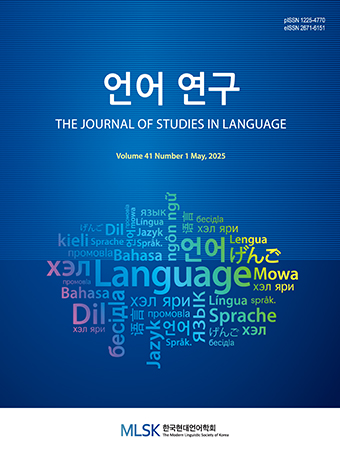Research Article
Abstract
References
Information
The study aims to explore the differences in the use of languages in social media communication (SNS) between generations from pragmatic perceptions. The paper first analyses the social media dialogues based on Grice(1975)’s Cooperative Principle and Sperber and Wilson(1995)’s Relevance Theory. Second, the survey results with 213 English native speakers and 255 Koreans in terms of the use of social media languages are discussed. The results show that there is a clear difference between generations in the use of SNS language by Koreans compared to native English speakers. The younger the generation is, the more SNS language is used while the older generations use less. Regarding whether the language used in SNS is understandable or not, there was a significant difference in the average between the 10s and 20s with people over 60s in the Korean group. In the case of English native speakers, the result is not proportional to age groups, unlike the Korean participants. However, except for the Korean 10s group, the majority of generations in both groups think that the social media language creates communication problems between generations.
- 곽면선 ‧ 이상철. 2014. 영어 트위터 메시지에 나타난 공손전략 분석. 『언어연구』 30.1.
- 국립국어원. 2018. 청소년 언어실태 심층조사 및 향상 방안 연구. 국립국어원.
- 권연진. 1998. 컴퓨터 통신어의 언어학적 연구. 『언어과학』 5-2, 257-271.
- 권혜련. 2001. 컴퓨터통신언어의 언어학적 연구-컴퓨터통신대화방언어를 중심으로. 석사학위논문 고려대학교 교육대학원.
- 박선우 ‧ 박진아 ‧ 홍정의. 2015. SNS 모바일 텍스트의 언어학적 양상: 성별과 연령의 차이를 중심으로. 『현대문법연구』 82, 95-120.
- 변길자. 2017. 한국어와 영어문자메시지 유형 비교 및 분석. 『언어학연구』 22.2, 71-95.
- 신승용. 2005. 통신언어와 국어교육. 『영남국어교육』 9, 12-26.
- 이정복. 2003. 『인터넷 통신 언어의 이해』. 서울: 월인.
- 이정복. 2011. 인터넷 통신 언어 실태와 세대 간 의사소통의 문제. 『배달말』 49, 29-69.
- 이정복. 2012. 스마트폰 시대의 통신 언어 특징과 연구 과제. 『사회언어학』 20.1, 177-211.
- 이진성. 2013. 영어 통신언어의 표기 특성과 한국어 통신언어와의 의사소통 전략의 차이. 『사회언어학』 21.3, 221-247.
- 임규홍. 2000. 컴퓨터 통신언어에 대하여. 『배달말』 27, 23-59.
- 정명규. 2001. 컴퓨터 통신언어 지도방안 연구. 경상대학교 석사학위논문.
- 최명원. 2014. SNS 기반 온라인 메신저 의사소통의 특징적 현상 연구-한국 대학생의 단문형식 메신저(SMS) 사용에 대한 설문을 바탕으로. 『독어학』 31, 145-172.
- Barker, V. 2012. A Generational Comparison of Social Networking Site Use: The Influence of Age and Social Identity. International Journal of Aging and Human Development. 74, 163-189. 10.2190/AG.74.2.d 22808625
- Craig, D. 2003. Instant messaging: The language of youth literacy. The Boothe Prize Essays. 118-119.
- Crystal, D. 2008. Txting: The Gr8 Dn8, Cambridge: Cambridge University Press.
- Dansieh, S. A. 2008. SMS testing and its potential impacts on students’ written. International Journal of English Linguistics. 223.1, 222-229.
- Grice, P. H. 1975. Logic and conversation. In P. Cole & J. Morgan (ed.), Syntax and Semantics 3: Speech Acts . New York: Academic Press, 41-58.
- Sperber, D. & D. Wilson. Relevance: Communication and Cognition. Blackwell, Oxford and Harvard University Press, Cambridge MA.
- Thurairaj, S. and S. S. Roy. 2012. Teachers’ Emotions in ELT Materual Design. International Journal of Social Science and Humanity 2, 232-236. 10.7763/IJSSH.2012.V2.101
- Thurairaj, S., E. P. Hoon, S. S. Roy and P. W. Fong. 2015. Reflections of Students’ Language Usage in Social Networking Sites: Making or Marring Academic English. The Electronic Journal of e-Learning 13, 302-316.
- 과학기술정보통신부. 2018. 인터넷이용실태조사 www.msit.go.kr
- 경향신문. 2017년 2월 17일. [신조어의 세계] 분명 우리말인데…외국어보다 높은 ‘언어장벽’ http://news.khan.co.kr/kh_newskhan_art_view.html?artid=201702172120005
- 머니투데이 2017.03.27‘…’ 말줄임표 부장 카톡에 밤잠 설친 김대리 http://m.mt.co.kr/renew/view.html?no=2017032114111013549
- 중앙일보. 2017년 4월 12일. [쓸·정] 말줄임표와 물결기호는 노화의 증거다? http://news.joins.com/article/21468699
- Nielsen Online. 2009. Global Faces and Networked Places. A Nielsen report on Social Networking’s New Global Footprint. http://blog.nielsen.com/nielsenwire/wpcontent/uploads/2009/03/nielsen_globalfaces_mar09.pdf.
- “My English Teacher” https://www.myenglishteacher.eu/blog/social-media-vocabulary-list-and-phrases/
- The Most Used Internet Abbreviations for Texting and Tweeting https://preply.com/en/blog/2018/05/04/the-most-used-internet-abbreviations-for-texting-and-tweeting/
- Publisher :The Modern Linguistic Society of Korea
- Publisher(Ko) :한국현대언어학회
- Journal Title :The Journal of Studies in Language
- Journal Title(Ko) :언어연구
- Volume : 35
- No :2
- Pages :161-183
- DOI :https://doi.org/10.18627/jslg.35.2.201908.161




 The Journal of Studies in Language
The Journal of Studies in Language






